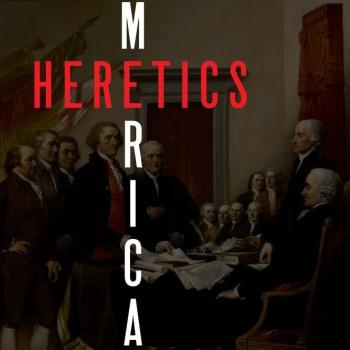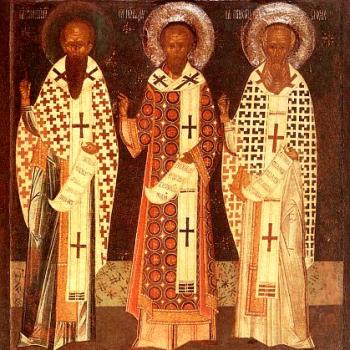On my campus, there are plenty of signs that religion is not going quietly into the night. On a thoroughfare outside the main student center, very loud preachers have been hosting “sin awareness” days. Is that really needed?
Pro-life groups have been stationed a hundred yards away, displaying fetal photographs and engaging passers-by in what appears to be polite conversation.
Meanwhile, the Catholic ministries center across the road is thriving, and the school’s population of visibly Muslim students continues to climb.
Books & Culture recently revisited the academy’s secularization, twenty-five years after George Marsden convened a conference on the subject while researching and writing his The Soul of the American University. Marsden, David Bebbington, D.G. Hart, James Turner, and Bradley Longfield contributed their updated thoughts.
A few highlights:
Longfield: “This tendency to seek to eliminate religious diversity in the academy reflects broader trends toward uniformity in higher education.” As evidence, Longfield points to the institutional defrocking of Christian organizations and notes that some are calling for rescinding the accreditation of Christian colleges.
Turner: “If all humanistic learning is to give way to scientific research and technical training, what’s the point in arguing about the Christian piece of it?”
Hart: “For all its defects and sometime silliness, secular higher education provides more room for believers and non-believers than any Christian college or university ever did. That’s not all bad.”
Marsden: “If … the numbers of high-quality ‘Mere Christian’ scholars keep expanding in anything like the way it has in the past quarter-century, the network of such scholars will be in a good position to be recognized, even if grudgingly, for what it already is: one of the most vital intellectual communities of our time.”
Bebbington: “In 2015, the self-consciously secular element and the confident Muslim presence exist alongside traditional Christian institutions and popular evangelical agencies. The universities of Britain are more secular than they were in 1990, but they are also more pluralist.”
For better or worse, the hospitality of the secular university toward Christian scholarship and teaching is not something to which I give much thought. As a Christian teaching in higher education, I feel somewhat guilty writing that sentence. I have the nagging sense that I ought to care a great deal about explicitly integrating my faith with my scholarship and teaching, and that I ought to care a great deal about whether or not there is space for Christian points of view within various institutions of higher education. Perhaps it’s the success of the above-mentioned “Sin Awareness” campaign, but I have a lot of guilty nagging senses about such things.
However, such concerns rarely if ever intrude on my day-to-day life. I mostly agree with Darryl Hart that the secular university — for historians, at least — provides a high degree of academic freedom, though I think many Christian institutions do as well (more so today than in past generations). I’ve never felt unable to say anything I wanted to say in the classroom.
The same is true of my scholarship. When I was attempting to place my dissertation on the history of Campus Crusade for Christ with a university press, I did get questions about whether or not I was “one of them.” It is not an irrelevant question, though probably less likely to arise had the subject been something more ideologically attractive to most academics. Especially with tenure, though, I feel rather unconstrained in terms of research and writing. Moreover, it helps that publishers, as far as I can deduce, are quite interested in religious history topics.
Another reason for my comfort is that I do not feel a need to adhere to a particularly Christian understanding of the discipline of history in my teaching and writing. In other words, although my faith informs my understanding of past events and their connection to the present and future, my faith has far less to do with how I understand the academic discipline of history. The latter rests on a fair-minded interpretation of primary-source evidence coupled with a fair-minded assessment of the historiography. Christian historians, in my view, should be quite content to play by the academic rules of the game.
Finally, it is worth noting that the “academy” and the “campus” are not the same thing, by any means. And if the academy is at least as secular as it was a quarter-century ago, most American colleges and universities are still relatively hospitable environments for religion. That has been changing in recent years, as some administrations and politicians have sought to drive out religious organizations that do not conform to current campus standards of “diversity” or sexuality. Nevertheless, most public universities remain fairly open marketplaces of religion. Which always makes me feel much better about “Sin Awareness” days.












